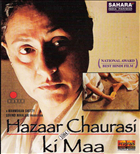(1998)
Dir: Govind Nihalani
Cast: Jaya Bhaduri, Anupam Kher, Joy Sengupta, Nandita Das
As the years rolled on after Indian independence, the country’s young generation grew progressively restless seeing their lofty dreams of justice and equality slowly fading away. Borne out of this frustration and disenchantment was Naxalism – an aggressive leftist philosophy, which justified violence as a social weapon for eliminating the whole hierarchy of the corrupt sociopolitical system. Mahasweta Devi’s novel Hazaar Chourasi Ki Maa on this controversial subject was very sensitively made into a National Award-winning film by Govind Nihlani.
In the middle of the night, Sujata Chatterji (Jaya Bhaduri) gets a phone-call to come to the government morgue to identify whether the body tagged as No.1084 (Hazaar Chourasi in Hindi!) is her son’s! It does turn out that the bullet-ridden dead body is her son Bratee’s. The devastated mother is further shattered to know that her slain son was a Naxalite leader wanted by the police.
With passage of time, the world moves on as usual. Bratee’s typically bourgeois father (Anupam Kher) goes to the extent of even refusing to acknowledge any relation to his dead son but the grieving mother simply cannot let go of past. She desperately clings on to her dead son’s memories, trying to make sense of his short life and violent death. She realizes that in her routine of cushy banking job and domestic chores, she had never bothered to find out her young son’s sociopolitical ideological views.
She starts to regularly visit the poor hutment-dwelling family of Bratee’s friend Somu (who was also slain in the same incident!). She also meets Bratee’s girl-friend Nandini (Nandita Das), who has just been released after a jail-term for indulging into Naxalite activities. From these people, she comes to learn more about her son’s way of life, his struggle for equality. In the process, she also comes to question her own quiet, subservient attitude towards her affluent family’s self-indulging antics.
On a personal scale, this film is about a mother’s emotional journey to understand her dead son’s ideology but on a broader scale, it probes a deeper question of society’s own role in its upliftment. The film has been accused of painting a rosy picture of the anti-establishment, underground Naxalite movement and there is some truth in that criticism. But the film’s main aim is to point out the individual apathy of the majority towards social ills and it succeeds in its attempt.
Jaya Bhaduri superbly portrays the title role of a vulnerable yet determined mother and the rest of the actors also pitch in fine performances. It is a serious film on a serious subject and even though it portrays the events in the time-frame of 1970 – 1972, the issues it highlights are as relevant today.


